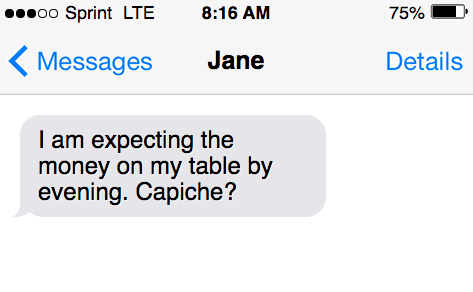What does the word “capiche” mean? Why is it used in American English to say something in a stern manner? Where did the idiom originate?
Learn what “capiche” means in this short idiom guide…
What does “capiche” mean?
“Capiche” is an Italian term but is used in English frequently. Derived from the Italian ‘capisci che’, it means ‘understand that?’ In simple terms, it means ‘did you understand that’? This is a common expression used while speaking. Placing a question word at the end of a sentence converts a statement into a question.
“It is time to start studying, understand?” The use of understand with a question mark turns this statement into a question. It is not merely asking something, but stressing on a point in a clear manner. When capiche is used in a sentence, it effectively means ‘you better understand. Usually, capiche is used in a threatening or assertive way.

It can also be used sarcastically. This would depend on the situation in which it is used. In general, capiche can mean any of the following:
- I hope you are understanding what I am saying.
- Did you get what I said?
- Are we clear?
- Did you get my drift?
- Can you understand what I am saying?
- Understood?
- You better have no confusion about what I said.
The threatening way in which the word is used imitates the Italian mafia in popular culture. ‘Capiche?’ can be used by underworld dons to threaten rivals asking them if they understood what they were supposed to do.
Some people use it colloquially to mean ‘I understood.’ When the sentence ends as ‘capiche’ without the question mark, it is supposed to mean ‘I have understood’. This is not correct.
Is it spelled “capiche” or “capeesh”?
Actually, the original word is ‘capisci’. But it is used in a slang way as ‘capiche’. Some people also use ‘capische’ and ‘capeesh’. Since all these are variations, they are acceptable in daily use. However, the most accepted form is ‘capiche’.
Origin of the idiom “capiche” or “capisci”
The origin of the idiom ‘capiche’ is an Italian phrase ‘capisci che’. It is a question asking whether the other understood. Capisci, in turn, is derived from the Italian word ‘capire’. It is believed that the word began to be used in the 1940s.
Its source word is ‘capire’ and can also be traced back to ‘capere’. So, the origin of this idiom is the Italian word ‘capere’. This word means ‘catch, take, or comprehend’. When this word is modified as capiche, it still retains its original meaning which is related to ‘catching the meaning of something’.
While Italians would use the phrase rightly, Americans converted it to slang. Since ‘capisci che’ was a bit difficult to say, it was condensed into one word ‘capiche.’ This made it easy to use. The word is also used as ‘capeesh’.
How to pronounce “capiche” and “capisci”?
Let’s first consider the Italian original word capisci. It is pronounced as cah-PEE-sheh.
The word is used in slang as capiche and is pronounced the same way as the original, which is cah-PEE-sheh. Some people pronounce it as cah-PEESH. This is technically not correct, since there is no K in Italian.
Examples of how to use “capisci” or “capiche” in a sentence
The word ‘capiche’, which is slang for ‘capisci’ can be used in sentences to mean ‘understand that?’
The following examples explain how to use it in a sentence:
- I am expecting the money on my table by evening. Capiche?
- The mother told her child, “I am going out to the market. You should not leave this room and complete your homework by the time I return. Capiche?
- It is only hard work that ensures success, luck has no role to play in this. Capiche?
- The police officer said, “Don’t think I am not watching you. I have an eye on you, and I expect you to run your business lawfully without trying to hoodwink anyone. Capiche?”
- Let me make it very clear. You break one more date, and that’s it. I am going to break up with you. Capiche?
- It doesn’t matter whether you co-operate with me or not. I am going to get what I want. Capiche?
What does “capische” in Italian mean?
Capische is derived from the Italian word capisci che, which means ‘understand?’
It is an interjection word asking someone if they have understood what is being said. As mentioned previously, the source Italian word is ‘capire’.
What language is the word “capiche”?
The word ‘capiche’ can be termed pseudo-Italian. It is derived from the Italian word ‘capisci’. This word is the 2nd person singular present form of capire, which means ‘to understand’. The original Italian phrase ‘capisci che’ has been converted to a slang form capiche.
It is one of the various American English words that have been borrowed from other languages. While it is an Italian word, it is used in English. The word is usually used at the end of the sentence.
Inside this article
Fact checked:
Content is rigorously reviewed by a team of qualified and experienced fact checkers. Fact checkers review articles for factual accuracy, relevance, and timeliness. Learn more.
Core lessons
Glossary
- Abstract Noun
- Accusative Case
- Anecdote
- Antonym
- Active Sentence
- Adverb
- Adjective
- Allegory
- Alliteration
- Adjective Clause
- Adjective Phrase
- Ampersand
- Anastrophe
- Adverbial Clause
- Appositive Phrase
- Clause
- Compound Adjective
- Complex Sentence
- Compound Words
- Compound Predicate
- Common Noun
- Comparative Adjective
- Comparative and Superlative
- Compound Noun
- Compound Subject
- Compound Sentence
- Copular Verb
- Collective Noun
- Colloquialism
- Conciseness
- Consonance
- Conditional
- Concrete Noun
- Conjunction
- Conjugation
- Conditional Sentence
- Comma Splice
- Correlative Conjunction
- Coordinating Conjunction
- Coordinate Adjective
- Cumulative Adjective
- Dative Case
- Determiner
- Declarative Sentence
- Declarative Statement
- Direct Object Pronoun
- Direct Object
- Diction
- Diphthong
- Dangling Modifier
- Demonstrative Pronoun
- Demonstrative Adjective
- Direct Characterization
- Definite Article
- Doublespeak
- False Dilemma Fallacy
- Future Perfect Progressive
- Future Simple
- Future Perfect Continuous
- Future Perfect
- First Conditional
- Irregular Adjective
- Irregular Verb
- Imperative Sentence
- Indefinite Article
- Intransitive Verb
- Introductory Phrase
- Indefinite Pronoun
- Indirect Characterization
- Interrogative Sentence
- Intensive Pronoun
- Inanimate Object
- Indefinite Tense
- Infinitive Phrase
- Interjection
- Intensifier
- Infinitive
- Indicative Mood
- Participle
- Parallelism
- Prepositional Phrase
- Past Simple Tense
- Past Continuous Tense
- Past Perfect Tense
- Past Progressive Tense
- Present Simple Tense
- Present Perfect Tense
- Personal Pronoun
- Personification
- Persuasive Writing
- Parallel Structure
- Phrasal Verb
- Predicate Adjective
- Predicate Nominative
- Phonetic Language
- Plural Noun
- Punctuation
- Punctuation Marks
- Preposition
- Preposition of Place
- Parts of Speech
- Possessive Adjective
- Possessive Determiner
- Possessive Case
- Possessive Noun
- Proper Adjective
- Proper Noun
- Present Participle
- Prefix
- Predicate



